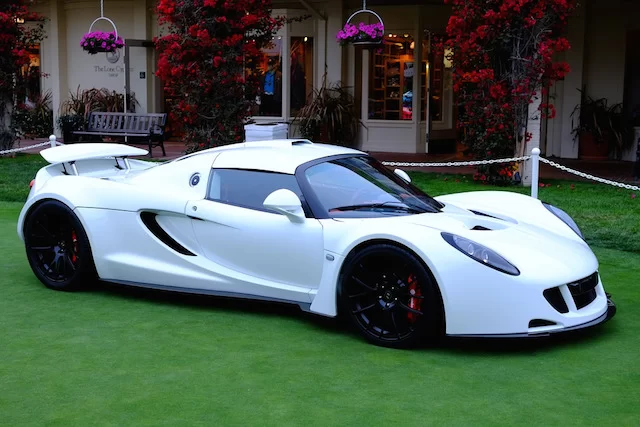The urge to go faster must be deep-rooted in the human psyche – before cars, it was trains and horses, but still the same urge. Perhaps it has something to do with our ancestors having to outrun large hungry marauding animals with big sharp teeth.

Despite the fact that the vast majority of roads in the world have speed limits imposed on them (the well-known exceptions being stretches of motorway in Italy or Germany), the need for speed is still there, and there’s no shortage of car manufacturers willing and able to help people satisfy that need. That satisfaction can be pretty pricey, though – top-speed cars command top-speed prices.
There’s also the issue of how you define the word ‘fastest’. The Guinness Book of Records has a category for ‘production’ cars as opposed to, say F1 cars – the vehicle must be in production, that is, not be a one-off prototype; it must be road legal and produced in sufficient numbers to be classified as available for the public to buy. This can be a pretty small number*.
Also, what aspect of speed are you measuring? The traditional top speed measurement is not the only one. A more useful measure is acceleration – this is much more useful on the road than absolute top speed. If you’re driving a Porsche 911 behind three cars towing caravans on a single-lane road, you’re much more likely to be able to overtake them all in one go than if you were driving a Hyundai Getz, and this is all about the acceleration, not top speed (witnessed by your author once in the UK).
Again your ability to get from point A to point B on a windy road has as much to do with the handling of the car than its sheer engine power. So by these three measures, it’s perfectly possible you’d have three different cars winning the coveted title of fastest car.
Having said all of this, US-based website Digital Trends has recently put up an article about the fastest 25 production cars in the world and defaulted to top speed as the base measure, so that will have to do.
What’s really interesting with this list is firstly, how quickly things change in the rarified world of super fast cars and secondly, how some brands you’d expect to be near the top just aren’t. Beautiful cars though they may be; Ferrari and Lamborghini are present in the list, but not really anywhere near the top.
A surprising late entrant to the list is Tesla’s new roadster, coming in at number 7 with a claimed top speed of 250mph (402 km/h) and all on electric power, with a battery pack twice the size of either the Tesla S or X models. Elon Musk has always worked on the premise that the electric car must compete on all measures with its petrol powered equivalents, and the new Roadster seems to have pulled this off, also boasting an impressive range of 620 miles (998 km) before it runs out of puff.
And some brands you’d expect to see included aren’t – BMW for example, although its engines power some of the cars in the list – the McLaren F1 has a 6.1l V12 BMW engine in it for example.
The other surprise is how many quite old models are still in the list – as well as the McLaren F1, the Jaguar XJ220 is also still there (with a top speed of 217 mph / 349 km/h), despite the fact that it was built in 1992.
Finally, another sign of the times is how the list is not entirely dominated by conventional internal combustion engine-driven cars. The Tesla is the only pure electric car that makes the list, but three other hybrid drive cars also appear – the Porsche 918 Spyder, the McLaren P1 and the eponymous Ferrari LaFerrari models. How long will it be before all the cars in the list are electric?
Did we forget to mention the fastest car? According to Digital Trends (but not, we might add, the Guinness Book of Records) it is the Hennessy Venom F5 with a top speed of 301 mph (484 km/h) and a price tag of AU$1.53M. It’s based on the rather less pricey Lotus Exige which comes in at a (comparatively) more affordable AU$139,000. Give us a call when you need to arrange the car loan for either model.
*25, apparently
Image credit: https://www.flickr.com/photos/el_ave/14768831359 Hennessy Venom GT



